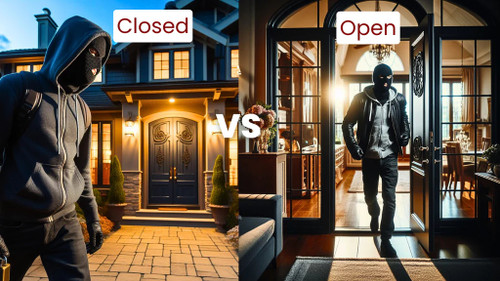Why Locking Your Door is More Important Than You Think
Posted by Door Armor on Jun 16th 2025
We've all been there. You're rushing out the door to grab the mail, a friendly neighbor waves hello, and suddenly you realize... you forgot to lock the door! A quick dash back inside, a twist of the knob, and a sigh of relief. "It's a quiet neighborhood," you think, "probably nothing to worry about."
But hold on a minute. While a friendly atmosphere is certainly a perk, the truth is, crime can happen anywhere, anytime. Imagine returning home after a relaxing day out to find your belongings scattered, or worse, feeling a stranger's presence lingering in your safe haven. It's a chilling thought, and one that can be easily prevented with a simple habit: always locking your doors.

Locking your doors might seem like a no-brainer, but you'd be surprised how often it gets overlooked. This blog post is to remind you why securing your entry points is more important than you think. We'll look at how effective locking a door can be, the benefits of good door-locking habits, how to build a robust home security system, and address some common excuses that might lead to leaving your doors unlocked.
How Effective is Locking Your Home Doors at Deterring Intruders
Many burglars are opportunistic, looking for easy targets. When you lock your door, you make it harder for burglars to get into your home. The burglar either has to kick in the door, which might be time-consuming and attract attention, or find another way without being detected. If you are at home, a locked door will slow down a would-be intruder and give you time to call for help from neighbors or the cops.
Although locking your door is an important home security measure, it might not deter a determined burglar who is armed with tools and techniques to get through your door. To stop this type of burglar, you need to kickproof your door with strong security locks like Door Armor reinforcement locks.
Benefits of Locking Your Doors
Peace of Mind
Knowing your home is secure creates a sense of calmness and tranquility. Whether you're relaxing at home, running errands, or away on vacation, a locked door allows you to truly unwind, confident that your belongings and loved ones are safe.
Protection of Valuables
Most of us have things we value in our homes – electronics, gadgets, jewelry, and keepsakes. A locked door acts as the first line of defense, creating a physical barrier between your possessions and potential thieves.
Safety for You and Your Loved Ones
An intruder isn't just a threat to your valuables; he is a threat to your personal safety. A locked door provides an extra layer of protection and gives you time to react or call for help in case of an attempted break-in.
Reduced Risk of Insurance Claims
Did you know that many homeowner's insurance policies require locked doors during unoccupied periods to qualify for full coverage? Locking your doors becomes less about habit and more about ensuring you have complete financial protection in case of a break-in.

Some additional ways to strengthen your home security
- Invest in a peephole or a doorbell camera. Being able to identify visitors before opening the door adds another layer of control and allows you to avoid unexpected encounters.
- Consider upgrading your door knobs to deadbolts, which provides a more secure locking mechanism. Additionally, consider reinforcing vulnerable areas like sliding glass doors with strong locking systems.
- Reinforce all doors and entry points in your home with robust door reinforcements for additional protection.
Common Excuses Why Some People Don’t Lock Their Doors
1. "It's a safe neighborhood"
Crime can happen anywhere, regardless of perceived safety. A recent study by the FBI's Uniform Crime Reporting Program (UCR) revealed that property crimes occur in both urban and rural areas. Don't let a false sense of security lull you into complacency.
2. "I'm just running out for a minute"
It only takes a few seconds for someone to take advantage of an unlocked door. Think about it – how long does it really take to grab that forgotten item or greet your neighbor? A few seconds of inconvenience can save you a world of trouble.
3. "I trust my neighbors"
While having good relationships with neighbors is a positive thing, it doesn't guarantee complete security. Your neighbors can't be there 24/7, and unfortunately, even the most trusting communities can experience crime. Take responsibility for your own security and lock your doors.
How to Develop Security Habits of Locking Your Doors
- Create a locking routine by training yourself to automatically lock the door whenever you leave, regardless of the duration. Leaving for work? Lock it. Stepping out to take the trash? Lock it. Consistency is key!
- Always double-check! Before leaving the house, get in the habit of double-checking that all doors and windows are secure. A quick mental note or a physical confirmation can give you peace of mind.
- Discuss the importance of locking doors as a family. Encourage everyone, including children (when age-appropriate), to participate in this security measure.
- If you find yourself forgetting to lock the door, leave a friendly reminder near your exit, like a sticky note saying "Lock Up!" or a keychain with a "Don't Forget!" message.
The very simple act of locking your door is a strong effort towards protecting your family, loved ones, privacy and valuables.



